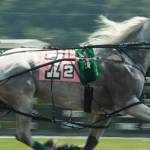Milne: Feeding Horses After Exercise for Optimal Recovery

Feeding for recovery after exercise is vital when horses compete in multiday events, especially those that encompass an endurance phase. Such competitions include three-day eventing, combined driving, endurance, and show-jumping events.
Nutritionists have identified three key considerations when feeding for recovery: rehydration, replenishment of muscle glycogen stores, and muscle repair and recovery.
Rehydration. Horses lose both water and electrolytes when they sweat during and after exercise. This needs to be replaced after exercise to avoid the negative consequences of dehydration on recovery. Though it is hard to estimate the amount of sweat lost in an exercise bout, pre- and post-exercise weight can provide a guide.
Plasma sodium levels drive thirst, so supplementation of sodium with other electrolytes is an important strategy at this time. If electrolytes are given in a paste or a stomach tube, the reliance on feed consumption is removed. Irritation of gastric ulcers can occur from electrolyte boluses or concentrated saline drenches. Kentucky Equine Research (KER) developed Restore Paste (available in the U.S. and Australia), an electrolyte supplement that contains gastric antacids and coating agents to minimize the gastric irritation.
Water replacement is vital and water should be offered after exercise. The taste of water often varies, and the horse may be reluctant to drink away from home even if thirsty. Mixing molasses with water can encourage consumption, or Drink-Up, a product developed by KER and available in Australia, can be added to water to encourage the horse to empty the water bucket. When horses eat hay, they will usually drink afterwards, so feeding hay after exercise is one way to boost thirst..
Replenishment of muscle glycogen stores. Carbohydrates, especially muscle glycogen, are key sources of energy for working muscle. When muscle glycogen is depleted during exercise, fatigue occurs rapidly. Because glycogen is a valuable energy substrate during exercise, replenishment is extremely important.
Diets high in soluble carbohydrates should have a positive effect on muscle glycogen repletion, but some studies have noted that glycogen resynthesis in horses is slow even when high-grain diets are fed. If repletion to pre-exercise levels does not occur, subsequent performance may be negatively affected. In humans, feeding carbohydrates soon after exercise affects the uptake of glucose by muscle and increases the synthesis of muscle glycogen as compared to feeding a carbohydrate source several hours after exercise.
Supplementation with electrolytes has a beneficial effect on glycogen repletion, so this is another reason for prompt electrolyte replacement after intense exercise.
Research has shown that horses fed high-fat, high-fiber diets can be slow to replenish glycogen, so at this time low-fat, high-carbohydrate grains such as oats or heat-processed barley and corn should be fed. Molasses adds sugar and encourages intake, so it is a good additive to a post-exercise feed. Of course, the horse must be acclimatized to the feed; otherwise, there is a risk of digestive disturbances such as hindgut acidosis and colic.
Just as carbohydrate loading doesn’t work in horses, the practice of giving oral sugar supplements, which is popular among human athletes, is ineffective in horses.
Muscle repair and recovery. An intense or prolonged exercise bout will lead to some muscle tissue damage and oxidative stress in muscles. Administering highly absorbable natural vitamin E (such as Nano•E from KER) for several days before competition will lead to increased blood and tissue levels of vitamin E and reduced oxidative stress, giving rise to faster recovery. Supplementation with vitamin C can also be useful at this time, but injectable or large oral doses must be given for it to be effective.
The period around exercise is a time when muscle uptakes amino acids, which are used to build and repair muscle fibers. Therefore, giving a small meal with a concentrated source of amino acids before exercise may be useful. Carbohydrate-rich meals that can influence plasma glycogen and insulin should not be given within four hours of intense exercise.








